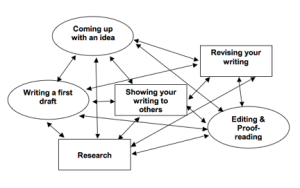Writing That Isn’t “Research Writing”
Not all useful and valuable writing automatically involves research or can be called “academic research writing.”
- While poets, playwrights, and novelists frequently do research and base their writings on that research, what they produce doesn’t constitute academic research writing. The film Shakespeare in Love incorporated facts about Shakespeare’s life and work to tell a touching, entertaining, and interesting story, but it was nonetheless a work of fiction since the writers, director, and actors clearly took liberties with the facts in order to tell their story. If you were writing a research project for a literature class which focuses on Shakespeare, you would not want to use Shakespeare in Love as evidence about how Shakespeare wrote his plays.
- Essay exams are usually not a form of research writing. When an instructor gives an essay exam, she usually is asking students to write about what they learned from the class readings, discussions, and lecturers. While writing essay exams demand an understanding of the material, this isn’t research writing because instructors aren’t expecting students to do additional research on the topic.
- All sorts of other kinds of writing we read and write all the time—letters, emails, journal entries, instructions, etc.—are not research writing. Some writers include research in these and other forms of personal writing, and practicing some of these types of writing—particularly when you are trying to come up with an idea to write and research about in the first place—can be helpful in thinking through a research project. But when we set about to write a research project, most of us don’t have these sorts of personal writing genres in mind.
So, what is “research writing”?
Research writing is writing that uses evidence (from journals, books, magazines, the Internet, experts, etc.) to persuade or inform an audience about a particular point.
Research writing exists in a variety of different forms. For example, academics, journalists, or other researchers write articles for journals or magazines; academics, professional writers and almost anyone create web pages that both use research to make some sort of point and that show readers how to find more research on a particular topic. All of these types of writing projects can be done by a single writer who seeks advice from others, or by a number of writers who collaborate on the project.
Academic research writing— is a form of research writing. How is academic research writing different from other kinds of writing that involve research? Academic research projects come in a variety of shapes and forms. But in brief, academic research writing projects are a bit different from other kinds of research writing projects in three significant ways:
- Thesis: Academic research projects are organized around a point or a “thesis” that members of the intended audience would not accept as “common sense.” What an audience accepts as “common sense” depends a great deal on the audience, which is one of the many reasons why what “counts” as academic research varies from field to field. But audiences want to learn something new either by being informed about something they knew nothing about before or by reading a unique interpretation on the issue or the evidence.
- Evidence: Academic research projects rely almost exclusively on evidence in order to support this point. Academic research writers use evidence in order to convince their audiences that the point they are making is right. Of course, all writing uses other means of persuasion—appeals to emotion, to logic, to the credibility of the author, and so forth. But the readers of academic research writing projects are likely to be more persuaded by good evidence than by anything else.“Evidence,” the information you use to support your point, includes readings you find in the library (journal and magazine articles, books, newspapers, and many other kinds of documents); materials from the Internet (web pages, information from databases, other Internet-based forums); and information you might be able to gather in other ways (interviews, field research, experiments, and so forth).
- Citation: Academic research projects use a detailed citation process in order to demonstrate to their readers where the evidence that supports the writer’s point came from. Unlike most types of “non-academic” research writing, academic research writers provide their readers with a great deal of detail about where they found the evidence they are using to support their point. This processes is called citation, or “citing” of evidence. It can sometimes seem intimidating and confusing to writers new to the process of academic research writing, but it is really nothing more than explaining to your reader where your evidence came from.
The Process of Research Writing
Writing as a Process: A Brief Explanation and Map
No essay, story, or book simply “appeared” one day from the writer’s brain; rather, all writings are made after the writer, with the help of others, works through the process of writing.
Generally speaking, the process of writing involves:
- Coming up with an idea (sometimes called brainstorming, invention or “pre-writing”);
- Writing a rough draft of that idea;
- Showing that rough draft to others to get feedback (peers, instructors, colleagues, etc.);
- Revising the draft (sometimes many times); and
- Proof-reading and editing to correct minor mistakes and errors.
An added component in the writing process of research projects is, obviously, research. Rarely does research begin before at least some initial writing (even if it is nothing more than brainstorming or pre-writing exercises), and research is usually not completed until after the entire writing project is completed. Rather, research comes in to play at all parts of the process and can have a dramatic effect on the other parts of the process. Chances are you will need to do at least some simple research to develop an idea to write about in the first place. You might do the bulk of your research as you write your rough draft, though you will almost certainly have to do more research based on the revisions that you decide to make to your project.
There are two other things to think about within this simplified version of the process of writing. First, the process of writing always takes place for somereason or purpose and within some context that potentially change the way you do these steps. The process that you will go through in writing for this class will be different from the process you go through in responding to an essay question on a Sociology midterm or from sending an email to a friend. This is true in part because your purposes for writing these different kinds of texts are simply different.
Second, the process of writing isn’t quite as linear and straight-forward as this list might suggest. Writers generally have to start by coming up with an idea, but writers often go back to their original idea and make changes in it after they write several drafts, do research, talk with others, and so on. The writing process might be more accurately represented like this:
Seem complicated? It is, or at least it can be.
So, instead of thinking of the writing process as an ordered list, you should think of it more as a “web” where different points can and do connect with each other in many different ways, and a process that changes according to the demands of each writing project. While you might write an essay where you follow the steps in the writing process in order (from coming up with an idea all the way to proofreading), writers also find themselves following the writing process out of order all the time. That’s okay. The key thing to remember about the writing process is that it is a process made up of many different steps, and writers are rarely successful if they “just write.”

